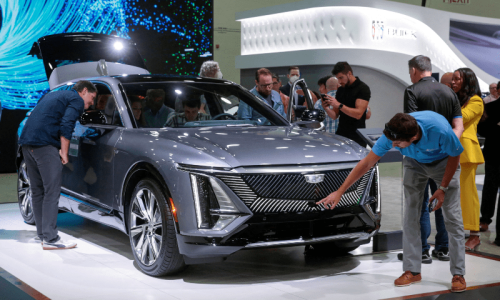BRUSSELS: EU countries gave a definitive green light on Friday to hefty additional tariffs on electric cars made in China, despite strong German opposition and fears it will trigger a trade war with Beijing.
The European Commission — which provisionally approved the step in June after an inquiry found that Beijing’s state aid to auto manufacturers was unfair — now has free rein to impose steep tariffs for five years from end October.
China has slammed the “protectionist” tariffs and promised retaliation, but talks on addressing the subsidy dispute will continue between the two sides despite Friday’s vote.
Berlin opposes move, says it will trigger trade war with Beijing
Ten member states including France, Italy and Poland supported imposing the tariffs of up to 35.3 per cent, coming on top of existing duties of 10pc, several European diplomats told AFP.
Only five, including Germany and Hungary, voted against while 12 abstained, including Sweden and Spain. Madrid initially supported tariffs before reversing course to call on Brussels to “reconsider” its decision.
Although the tariffs did not win support from a majority of states, the opposition was not enough to block them — which would have required at least 15 states representing 65pc of the bloc’s population.
That leaves the choice on moving ahead in the hands of the European Commission — in charge of trade policy for the bloc — which said it had “obtained the necessary support for the adoption of tariffs”.
After the vote, China’s commerce ministry urged EU states to “return to the right track” by resolving trade frictions through dialogue.
“China firmly opposes the EU’s unfair, non-compliant and unreasonable protectionist practices in this case,” it said in a statement shared by state broadcaster CCTV.
‘Fatal signal’
The EU duties have pitted France and Germany against each other, with Paris arguing they are necessary to level the playing field for EU carmakers against Chinese counterparts.
Germany, renowned for its strong auto industry and its key manufacturers including BMW, Volkswagen and Mercedes heavily invested in China, urged the commission not to go ahead.
The vote’s results demonstrate how the EU’s biggest trade investigation in years has ruffled feathers, with the bloc’s biggest economy vehemently against the duties.
“The EU Commission should not trigger a trade war despite the vote in favour” of the tariffs, German Finance Minister Christian Lindner said. “We need a negotiated solution.” Berlin has strong arguments on its side: Beijing has threatened to hit back hard and has already opened probes into European brandy, dairy and pork products imported into China.
“We will face all types of retaliation from China, that’s for sure,” one diplomat said.
China tried in vain to stop the duties coming into force through dialogue, but talks have so far failed to produce an agreement that satisfies the EU.
Any duties could be lifted later if China addresses the EU’s concerns.
Carmakers divided
French and German automakers are likewise divided over the duties.
German auto giant Volkswagen said they “are the wrong approach” while BMW said the vote was “a fatal signal for the European automotive industry”.
Both manufacturers urged more talks to prevent a trade conflict.
Meanwhile, US-French-Italian auto group Stellantis said it “takes note” of the vote, repeating its commitment to “free and fair competition”, echoing similar cautious comments made by the umbrella group, the European Automobile Manufacturers Association.
The extra duties also apply, at various rates, to vehicles made in China by foreign groups such as Tesla — which faces a tariff of 7.8pc.
Published in Dawn, October 5th, 2024














































Dear visitor, the comments section is undergoing an overhaul and will return soon.